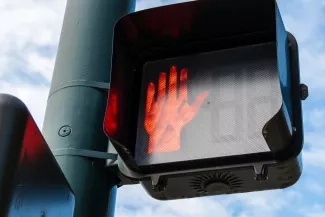Why It Matters

Photo by Elijah Mears | Unsplash
Several years ago, I attended a medical conference where a speaker made an unexpected request:
“If you know a physician who has died by suicide, please raise your hand.”
More than half of those in attendance put a hand in the air. I was one of them. The speaker then asked us to keep our hands raised if we knew two people, then three people. I kept my hand raised throughout. So did about a quarter of the people in the room.
I no longer remember if the speaker asked us if we knew more than three physicians who died from suicide. I do remember the gasps at how many of us were raising our hands. When we do not talk about their deaths, we are left thinking we are the only ones grieving the loss of multiple colleagues and friends.
Physician suicide is not common, but like all preventable deaths, it is devastating and results in grief and trauma. There are best practices for reducing the risk of suicide in physicians, but too few are adopted. Many recommendations focus on removing the stigma around showing vulnerability and seeking help. This kind of culture change — as anyone who has worked to create a culture of safety can attest — can be difficult to achieve, takes a great deal of time and effort, and involves factors often not under a single leader or individual’s control. But there are also tactics that are meaningful, easy to adopt, and should be more widely used.
One way to reduce the risk for physician suicide is to remove the barriers to seeking mental health care. This includes eliminating physician credentialing- and licensing-related impediments. Asking about an applicant’s mental health on a license form is a longstanding practice founded upon a mistaken belief that identifying physicians with a mental health diagnosis helps ensure safer care. Unfortunately, achieving patient safety is far more complex than this, and no research has found an association between asking about mental health and quality of care. In contrast, research has shown a robust association between these kinds of questions on medical license applications and physician reluctance to seek mental health care.
Non-physicians may be surprised that applications include these questions or that language on an application could be powerful enough to deter someone from seeking care. Unfortunately, this fear is widespread and possibly unsurprising given that a license is required to practice. One representative example of a medical license application question reads, “Have you ever been diagnosed as having, or have you ever been treated for, pedophilia, exhibitionism, or voyeurism, bipolar disorder, sexual disorder, schizophrenia, paranoia or other psychiatric disorder?” Questions like this can imply a correlation between psychiatric diagnoses experienced broadly in the population (such as depression or anxiety) with appalling, illegal, and unethical practices. Questions like this also fail to identify whether an applicant can safely practice medicine.
Similar questions are also often present on credentialing applications that are part of the process for granting permission to practice in a specific clinic, hospital, or health system. For example, instead of solely focusing on the clinical skills, competence, and professionalism needed to ensure safe and quality care, peer references may be asked to comment on whether the applicant has a mental health condition.
What Can Be Done
Recognizing the importance of having healthy clinicians, the Institute for Healthcare Improvement (IHI) Leadership Alliance has been hosting a coalition from across the country since the spring of 2021 to advocate for the removal of stigmatizing questions from medical applications. The Help Health Care Heal Coalition has been educating peers, professional society members, and health care institutions about the problems these questions pose. The Coalition invites individuals and groups interested in joining our advocacy efforts to use our publicly available resources, including talking points, a sample email, and suggested alternative questions for state boards and credentialing committees.
My experience corroborates the research showing physicians have widespread concern about being asked about mental health care on their applications. I have fielded many tearful calls from peers and medical students worried they cannot see a therapist or start an antidepressant because they are afraid it will affect their ability to maintain their license or get a job. More concerningly, I have received calls from friends of physicians experiencing suicidal thoughts who feared getting mental health care for similar reasons.
I will never forget all those hands raised by those of us who have lost physician colleagues and friends to suicide. There are many factors that contributed to that moment, but destigmatizing the use of mental health support is one way to help. We should support all health care workers. Safe patient care and clinician well-being are not at odds.
Eileen Barrett, MD, MPH, practices internal medicine on the Navajo Nation.
If you or someone you know may be considering suicide or are in crisis, please call or text 988 to reach the Suicide & Crisis Lifeline.
